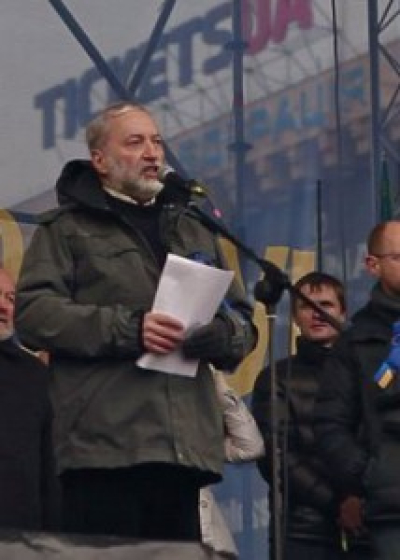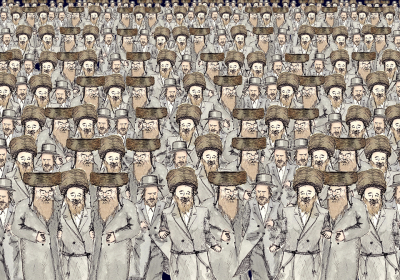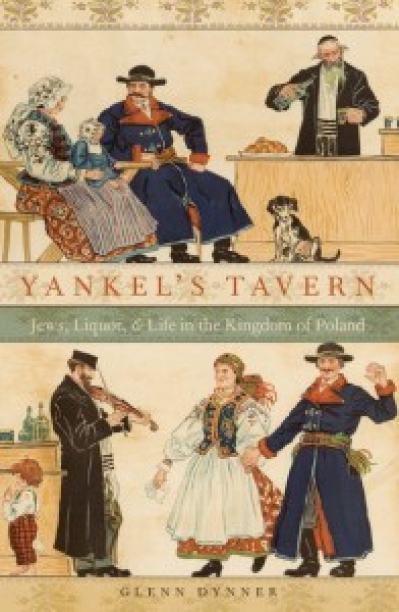News & Features
Newsletters | YIVO in the Media | Press Releases

From the Pages of Yedies
by ROBERTA NEWMAN When YIVO relocated to the United States in 1940, it wasted no time in establishing itself as a major repository of Jewish history. While it waited to learn the fate of its collections, building, workers, and associates in Vilna, it set out building a new home and mission ...

What Now? Jews and the Ukrainian Revolution 2014: Interview with David Fishman
On Thursday, April 24, YIVO will present “What Now? Jews and the Ukrainian Revolution 2014,” a conversation with Josef Zissels, the preeminent leader of Ukraine’s Jewish community, and moderator, David Fishman. Zissels and Fishman will discuss the political situation in Ukraine today, Ukraine’s relationship to Russia and the European Union (EU), and what Ukrainian Jews and minorities can expect from the new government.
Read Josef Zissels's speech at Maidan.
Attend the event.
YIVO Public Program Director Helena Gindi interviewed David Fishman, professor of Jewish History at The Jewish Theological Seminary about the situation in Ukraine.

Six YIVO Alumni Recipients of Yiddish Book Center Translation Fellowships
by LEAH FALK
Traduttore, traditore, goes the Italian proverb: to translate is to betray. But at YIVO, the opposite seems true. Six recipients of the Yiddish Book Center’s 2014 Translation Fellowships are fiercely loyal YIVO Max Weinreich Center alumni. The fellows include Beata Kasiarz, Helen Mintz, Sarah Ponichtera, Sasha Senderovich, Anna Torres, and Ri Turner.

Isaiah Trunk on the Lodz Ghetto (1964)
On December 20, 1964, historian Isaiah Trunk, a YIVO Research Associate and co-editor of the journals YIVO Annual and YIVO bleter, gave this interview to Sheftl Zak, host of YIVO’s radio program on WEVD, about his work researching the Lodz Ghetto and his book, Lodzher geto: a historishe un sotsyologishe ...

From the Pages of Yedies
by ROBERTA NEWMAN I have often marveled at the almost unbelievable accomplishments of the Jewish activists of yore. Dr. Tsemach Szabad (1864-1935),for example, the legendary cultural leader and doctor from Vilna. Playing a leading role in the founding of YIVO in 1925 was only one of his projects in the period ...

The Sun Never Sets on the Yiddish Empire: An Interview with YIVO Fellow Karolina Szymaniak
Karolina Szymaniak The recipient of YIVO’s Dina Abramowicz Emerging Scholar Fellowship for 2013-2014, Karolina Szymaniak, is an Assistant Professor at the Jewish Historical Institute in Warsaw, where she also heads the Yiddish Culture Lab. Having earned her Ph.D. in literary and cultural studies from the Jagiellonian University in Kazimierz, Poland, she ...

YIVO Welcomes Wesleyan University Students Investigating Jewish Material Culture
By JENNIFER YOUNG Professor Magda Teter, an instructor in YIVO’s Winter Program on Ashkenazi Civilization, visited YIVO on April 30 with her class from Wesleyan University, to participate in a full-day workshop on Jewish material culture. Teter’s Wesleyan course in East European Jewish History aims to take students beyond the common ...

Jewish Arts Profile: Radzyn Stories
Radzyn Stories is a graphic novel for the Internet, interweaving text and art to tell a story based on the legacy of the Izhbits-Radzin Hasidic Dynasty, a small, but influential branch of Hasidism, some of whose teachings have become known to a wider audience through the work of the late Rabbi Shlomo Carlebach (1925–1994).
On their website, Michael Weber and Joel Golombeck have set out to tell a modern folktale about Radzyn and its Hasidim. As their introduction notes, Radzyn Stories is “a fictional story inspired by a very real place.”
Michael Weber was interviewed by Yedies Editor Roberta Newman.

From the Pages of Yedies
by ROBERTA NEWMAN This year, the 1938 Yiddish film classicMamele, starring Molly Picon, perhaps the world’s best-known Yiddish actress, was screened at the New York Jewish Film Festival in a version newly restored by the National Center for Jewish Film. But the first rediscovery of this film occurred in September 1978, when ...

The Jewish Tavern as Part of the Polish Landscape: Interview with Glenn Dynner
In Yankel's Tavern: Jews, Liquor & Life in the Kingdom of Poland (Oxford University Press, 2014), Glenn Dynner examines the iconic Polish Jewish tavernkeeper in the Kingdom of Poland.
In nineteenth-century Eastern Europe, the Jewish-run tavern was often the center of leisure, hospitality, business, and even religious festivities. This unusual situation came about because the nobles who owned taverns throughout the formerly Polish lands believed that only Jews were sober enough to run taverns profitably, a belief so ingrained as to endure even the rise of Hasidism's robust drinking culture.
As liquor became the region's boom industry, Jewish tavernkeepers became integral to both local economies and local social life, presiding over Christian celebrations and dispensing advice, medical remedies and loans. Nevertheless, reformers and government officials, blaming Jewish tavernkeepers for epidemic peasant drunkenness, sought to drive Jews out of the liquor trade. Their efforts were particularly intense and sustained in the Kingdom of Poland, a semi-autonomous province of the Russian empire that was often treated as a laboratory for social and political change.
Historians have assumed that this spelled the end of the Polish Jewish liquor trade. However, newly discovered archival sources demonstrate that many nobles helped their Jewish tavernkeepers evade fees, bans and expulsions by installing Christians as fronts for their taverns. The result—a vast underground Jewish liquor trade—reflects an impressive level of local Polish-Jewish co-existence that contrasts with the more familiar story of antisemitism and violence.
Buy the book.
Glenn Dynner is Professor of Judaic Studies at Sarah Lawrence College and the 2013-14 Senior NEH Scholar at the Center for Jewish History. In addition to Yankel’s Tavern, he is author of "Men of Silk": The Hasidic Conquest of Polish Jewish Society (Oxford University Press), winner of the Koret Publications Prize and finalist for the National Jewish Book Awards. He is editor of Holy Dissent: Jewish and Christian Mystics in Eastern Europe (Wayne State University Press); and co-editor of a forthcoming volume of Polin and of Warsaw, the Jewish Metropolis: Essays in Honor of the 70th Birthday of Professor Antony Polonsky.
He is interviewed here by Yedies editor, Roberta Newman.




